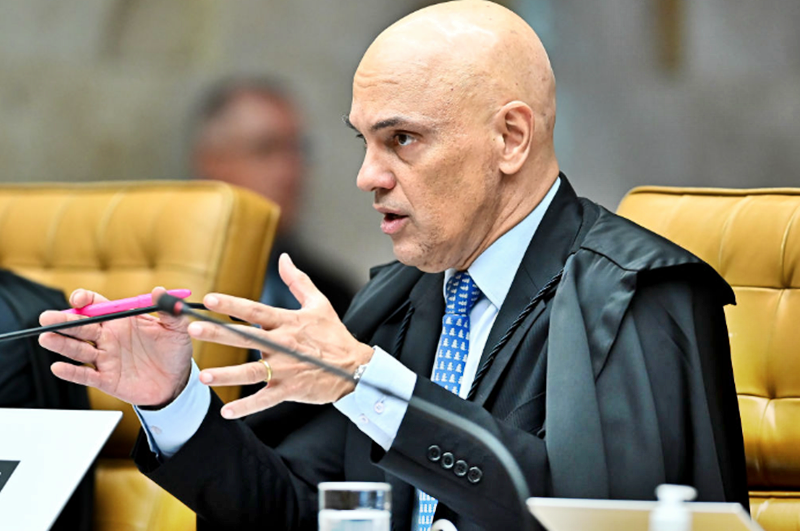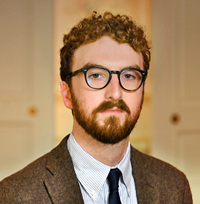Brazil’s Most Powerful Judge Is in the Spotlight—Again

By AmericasQuartely - Nick Burns - August 29, 2024
An escalating clash with Elon Musk and damaging revelations in the press are intensifying a long-running debate about whether Alexandre de Moraes is too powerful.
Alexandre de Moraes might be the second-most powerful person in Brazil. He does not quite have the reach of the president. But as a judge on the Supreme Court, until recently the president of the Electoral Court, and especially as head of two sprawling investigations against groups spreading disinformation, Moraes has wielded a rare combination of judicial powers.
He has unilaterally handed out fines, ordered arrests, social media bans and other sanctions, and even acted as investigator and judge at once.
Moraes, 55, has used those powers prolifically, including against several members of the right-wing opposition to Luiz Inácio Lula da Silva’s government.
Brazilian conservatives have long contended he is abusing his power. But “Xandão” (“Big Alex”), as he is semi-jokingly called by supporters and detractors alike, earned the gratitude of many members of Brazil’s political establishment who believed his actions were fundamental to defending democracy during and after Jair Bolsonaro’s tumultuous 2018-22 presidency.
Now, that goodwill is being put to the test. As international voices add to a swelling domestic chorus, criticism of Moraes is starting to break through into the mainstream of Brazilian discourse.
The most public clash has been between Moraes and the South African billionaire Elon Musk, who has vigorously resisted the judge’s efforts to control speech on his X platform and other social media. On Wednesday, Moraes used X itself to send Musk an ultimatum to appoint a new legal representative for his company in Brazil, and threatened a total ban of the platform in Latin America’s largest country unless he complied. Several Brazilian legal experts told Estado de S.Paulo newspaper that Moraes was overstepping his powers. Regardless, Moraes followed through and ordered X banned in Brazil on Friday.
Also recently, reporting by Fabio Serapião and Glenn Greenwald, the well-known American journalist who lives in Brazil, in Folha de S.Paulo newspaper indicated that Moraes and his lieutenants skirted official procedure in preparing sanctions for targets of his investigations.
These controversies have put renewed focus on several questions: Is Moraes censoring the opposition, or guarding Brazilian democracy? What should be the balance between allowing political speech on social media—and fighting back against disinformation and other threats? And finally: Has Moraes’ power outlived its usefulness, placing due process and the rule of law under threat in a different but also harmful way?
“It’s clear he’s pushing the limits,” said Conrado Hübner, a professor of constitutional law at the University of São Paulo and columnist at Folha. “There’s no precedent, nothing remotely similar to having a minister leading … investigations that almost become permanent institutions.”
“It’s been a year and a half since the 2022 election and the departure of a president who threatened institutions,” wrote the editorial board of Folha on August 26. “But for minister Alexandre de Moraes and his colleagues at the Supreme Court, it’s as if it was still that time—at least as a pretext for maintaining the anomalous concentration of power in this magistrate and his court.”
Path to prominence
Moraes was appointed to the Supreme Court in 2017, but emerged as a major protagonist during Bolsonaro’s presidency.
That period was marked by Bolsonaro’s repeated threats to undermine or even dismantle Brazil’s democracy. A former Army captain and longtime defender of Brazil’s last dictatorship, Bolsonaro as president threatened to act outside the “boundaries of the Constitution,” repeatedly cast doubt on the integrity of Brazil’s electronic voting system, and threatened not to accept the result of the 2022 election, among other moves.
The Supreme Court emerged as a counterweight to defend Brazil’s institutions at a time when other branches of government including Congress were acting timidly, said Rafael Mafei, a professor at the University of São Paulo and legal expert who has written extensively on Brazil’s justice system.
Brazil’s judicial system gives Supreme Court justices much more sweeping powers than their U.S. counterparts, including the ability to make unilateral decisions—a power Moraes has not been shy about using. The judge has focused on stopping online disinformation, especially criticism and falsehoods about Brazil’s voting system, which many feared could endanger the country’s four-decade-old democracy.
Moraes “had a very important role at a very particular moment in the politics of Brazilian law,” said Mafei. Bolsonaro had “captured” the attorney general’s office and ensured that Congress remained pliant by ceding its members increased power over the budget, he said.
Bolsonaro lashed out. In a speech on Brazil’s independence day 2021, the then-president said he would not abide by any future decisions made by Moraes. He also ordered Moraes to close police investigations into his federal police appointments and other topics—and warned that if he failed to do so, the justice system could “suffer something we don’t want to happen.”
Bolsonaro later backed off those remarks, but tensions came to a head again as the 2022 election approached. On election day, Moraes prevented highway police from stopping buses full of voters in an area of Brazil dominated by Lula’s supporters. He also banned social media accounts of prominent figures who speculated the election had been stolen, and went after officials who failed to prevent the January 8, 2023 riot in Brasília—even suspending the governor of Brazil’s federal district from his job for three months.
“Right now he’s protecting democracy, and I think it’s a very necessary thing,” said Roberta Braga, executive director of the Digital Democracy Institute of the Americas, a nonprofit aimed at improving the digital information environment in Latin America. “But you could see a world in which someone else in his role, doing something similar in a different context, would generate a lot of problems.”
Some observers believe Moraes has already gone much too far.
Moraes banned the social media accounts of right-wing influencers Rodrigo Constantino and Paulo Figueiredo, for allegedly spreading Covid-19 misinformation and casting doubt on the Brazilian electoral system. He also banned the accounts of department store chain owner and right-wing influencer Luciano Hang, allegedly for agitating for a coup in a pro-Bolsonaro message group.
Blogger Allan dos Santos, in self-imposed exile in Florida, had his passport revoked after calling for the dissolution of the STF, and being accused of involvement in an “organized crime network” that operates through monetized videos online. The U.S. refused an extradition request—reportedly because it determined Santos’s actions aren’t considered a crime in the U.S.
“It’s persecution, pure and simple,” Santos said.
A growing list of accusations
The political temperature has moderated in Brazil over the past year, as a degree of institutional harmony has returned under Lula’s watch. But Moraes has remained on the offensive, threatening earlier this year to block Telegram, an encrypted messaging service, for refusing to comply with his orders. (Pavel Durov, the service’s founder, was arrested in France earlier this week for failing to prevent illegal activity on the platform.)
As part of the reporting on leaked documents from Moraes’ office in August, Greenwald wrote that former Bolsonaro advisor Filipe Martins had been detained under an order by Moraes for almost six months without charges, based on evidence that (Greenwald wrote) had been disproven. Less than a week later, Moraes ordered him released.
In reporting over the last several weeks, Greenwald and a co-author have used leaked messages to level accusations that Moraes directed his aides to compile reports on individuals, setting them up for social-media bans and other sanctions, and pass off the reports as having come from other legal organs or as anonymous complaints. The reports exacerbated concerns that Moraes was blurring the lines between legal roles—and so did his response, which was to order an inquiry into the source of the leaks.
In response to the leaks and other allegations, Moraes has denied any wrongdoing, arguing his actions were in line with the ongoing investigations, the details of which are secret, and that his decisions were upheld by the full Supreme Court.
For Mafei, the revelations published so far by Greenwald’s and Serapião don’t fully discredit Moraes’ work, in part because the design of Brazil’s institutions allows for a certain level of mixing between the roles of the Supreme Court and the Superior Electoral Tribunal, and permits the Supreme Court the unusual power to initiate cases itself.
But the facts are still worrying, many say. “Having an apparent attempt to dissimulate the origin of a request that was made by electoral justice, to make it seem a spontaneous movement,” Mafei said, “that seems, in my opinion, at minimum anti-ethical.”
Executives from several technology companies have complained about Moraes in private, arguing that he has contributed to making Brazil one of the world’s most restrictive democracies when it comes to online speech.
Meanwhile, the fight with Elon Musk also shows no sign of slowing. In April, Musk accused the judge of demanding “censorship” in Brazil, and Moraes returned fire by adding Musk to a list of suspects in the ongoing “digital militias” investigation.
In his spat with Moraes, Musk is casting himself as a global defender of free speech—extrapolating from his stance on similar issues in the U.S.—and many on the Brazilian right agree, hailing him as a hero who is stepping up to defend them from censorship.
But what’s in dispute in Brazil right now isn’t free speech in the abstract. It’s whether Moraes is operating in accordance with the power vested in him by Brazil’s constitution, and whether he’s properly respecting the rights to which citizens are entitled.
Brazil’s constitution protects the right to free speech, but also bans racism and discrimination. There’s regulation of the Internet on the books, and there’s pending legislation on how to handle fake news on the Internet, but for now the details of how social media platforms should be treated legally—as publishers, or something else?—remains unclear in Brazil, as in many other countries.
“I really regret the lack of clear criteria to distinguish what’s prohibited from what’s permitted,” Mafei told AQ.
In the meantime, it can be hard to fully judge Moraes’s actions, because of the secrecy under which—in accordance with Brazilian law—he is pursuing his two investigations. “There’s a criticism that [Moraes] maintains a very high level of secrecy over his proceedings for a long time, which makes lawyers’ work difficult,” said Mafei.
This article was updated on August 31 with the ban of X in Brazil.
ABOUT THE AUTHOR

